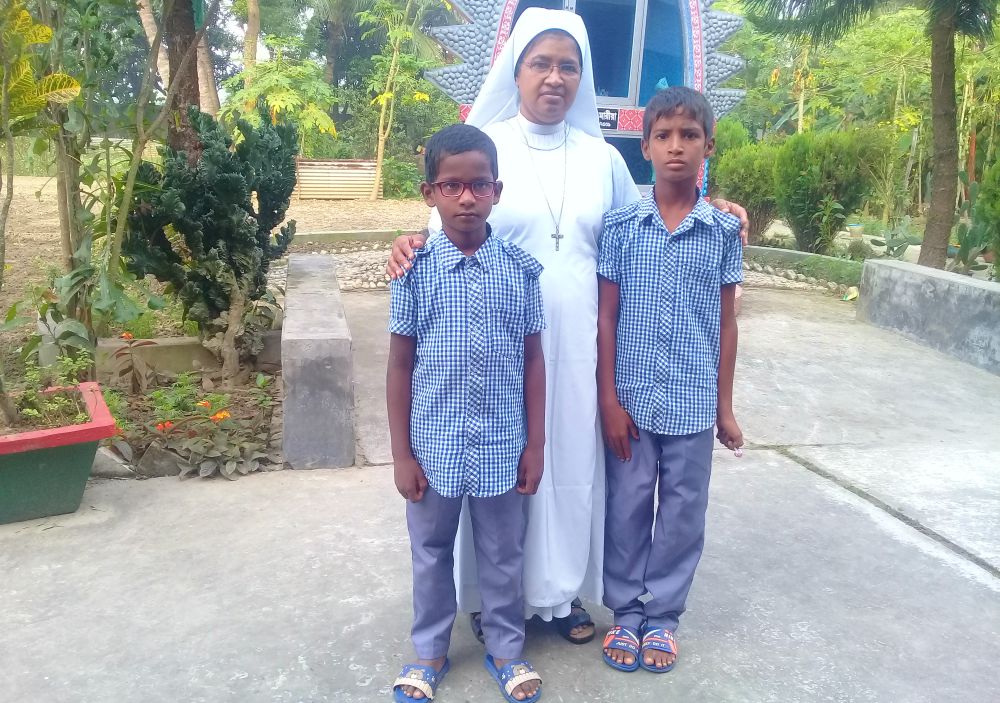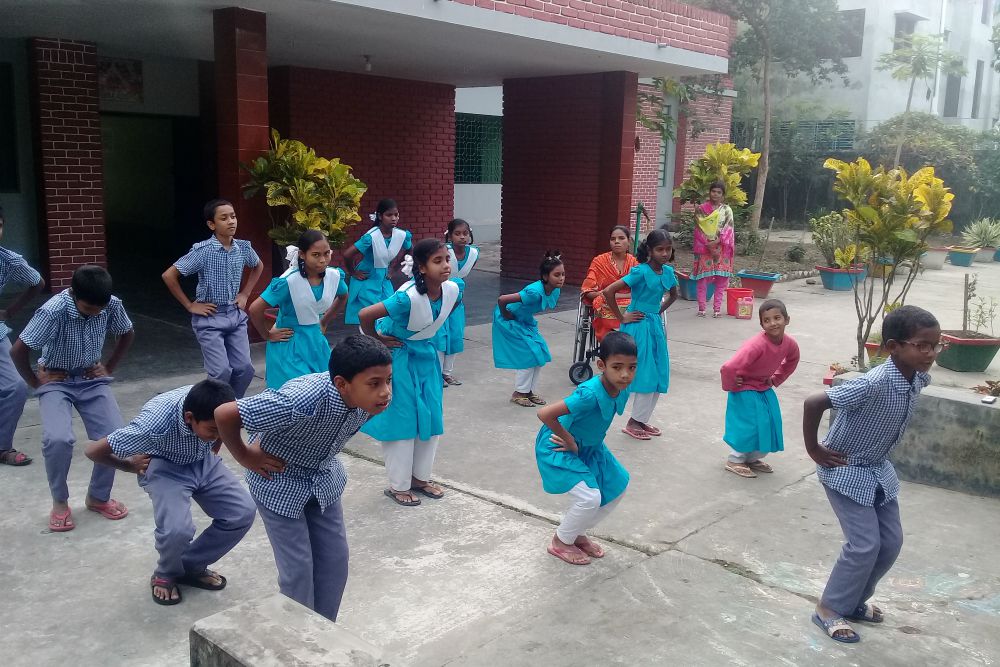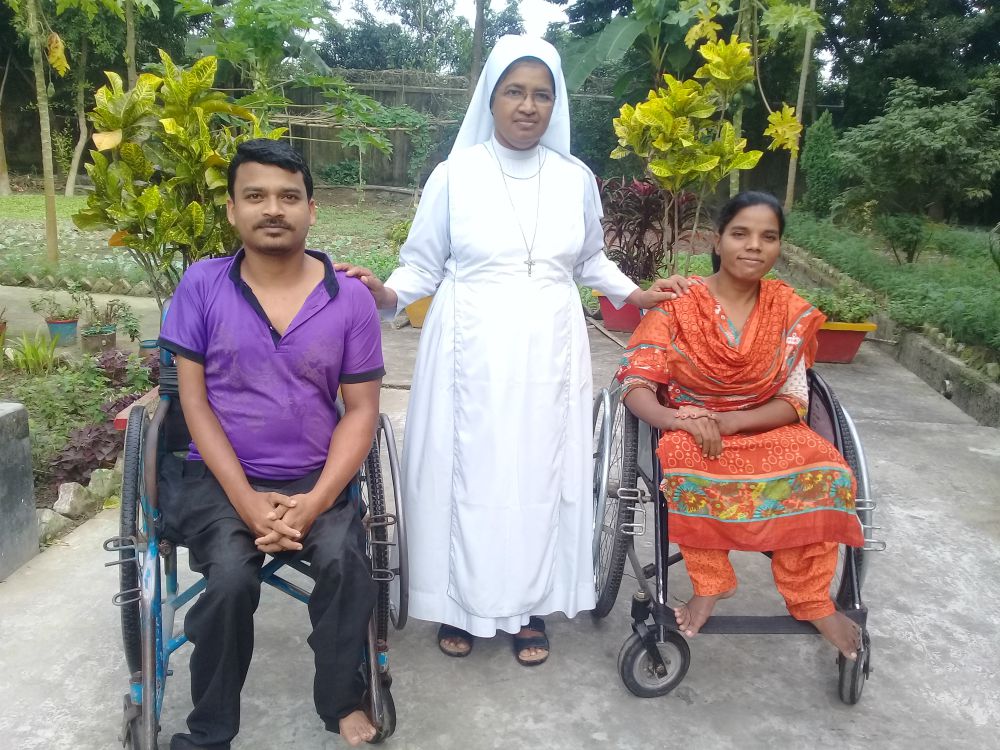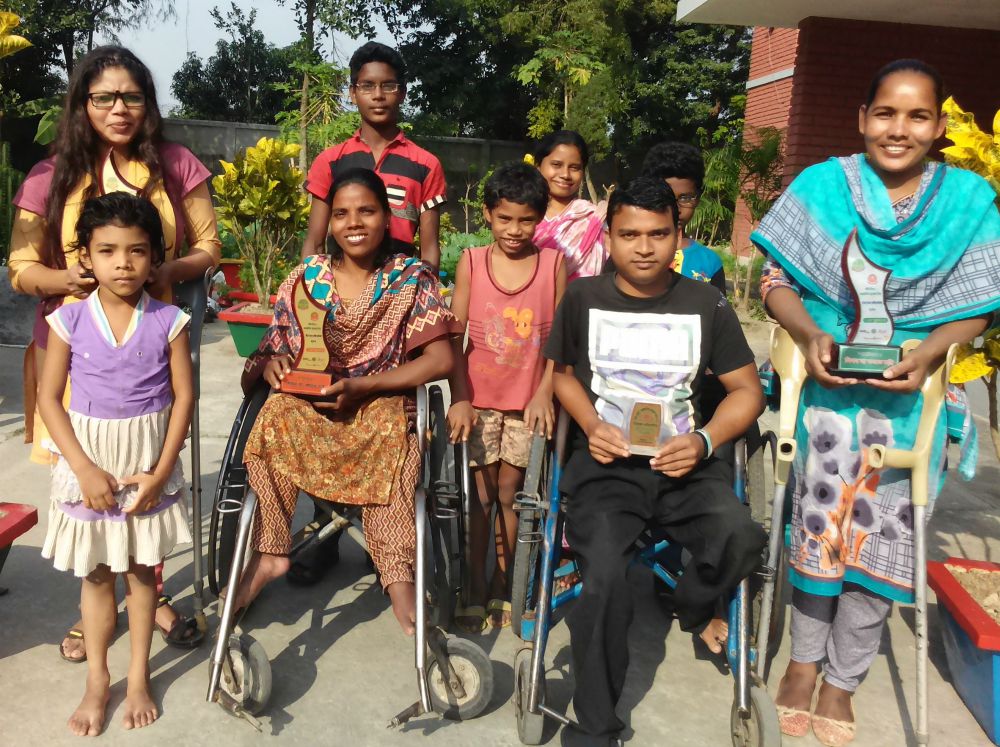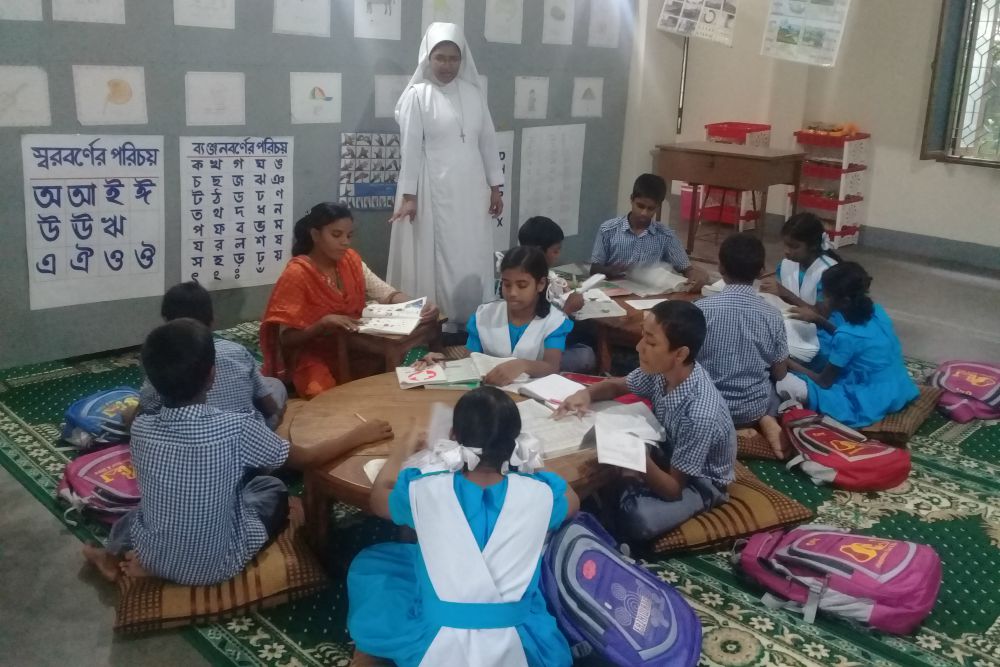
Sr. Dipika Magdeline Palma with students at Snehanir in Rajshahi, Bangladesh (Sumon Corraya)
In addition to his job as a computer operator and accountant at a shelter for the sick in Rajshahi, Martin Tudu provides part-time basic computer training for students ages 16 to 18 (grades 11 and 12) at a computer training center in the same city. The 36-year-old from the Santal tribe, who has used a wheelchair since he was 12, credits Snehanir (Home of Compassion) and the Catechist Sisters of the Immaculate Heart of Mary, Queen of Angels with changing his life for the better.
Snehanir is a community where children, some with disabilities or from poor families, live together, help each other, study, and prepare to support themselves. The Catechist Sisters of the Immaculate Heart of Mary, Queen of Angels have run the center since 1992 in this Muslim-majority country, and they currently care for 39 children and youths who are Christian, Muslim, Hindu and Buddhist. Snehanir is funded by the Pontifical Institute for Foreign Mission.
Tudu broke both of his legs playing football at the age of 12. The treatment he received did not heal his legs, and they slowly became paralyzed.
"When I lost my ability to walk, I cried lot," he said. "It seemed like I could not do anything. But thanks to the care of the nuns, my hope returned. I finished my grade 12 education by staying at Snehanir. They also provided me computer training. Now I am self-supported."
Tudu, who is Catholic, is now able to give money to his parents, and he married last July at Snehanir.
"I am a happy person in the world," Tudu said with a smile.
Advertisement
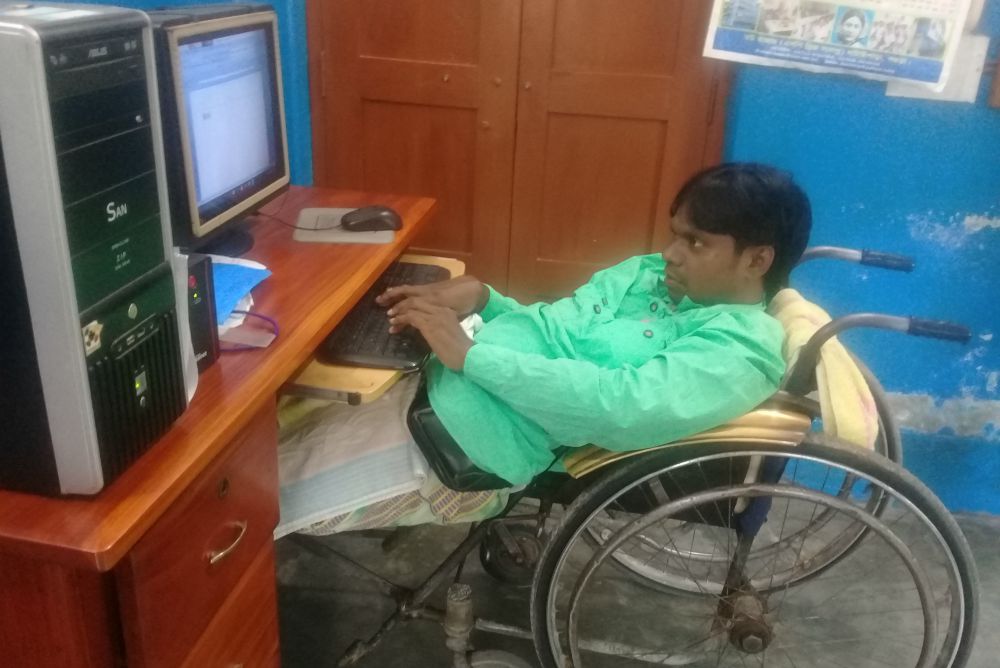
Martin Tudu, 26, a former student of Snehanir, works in a sick assistance shelter and also teaches computer skills in Rajshahi, Bangladesh. (Sumon Corraya)
"At the center, we merely can provide preschool and sign language classes," said Sr. Dipika Magdeline Palma, who is in charge of Snehanir. "Other children and youth attend outside schools, but enrolling in those schools was harder because principals used to think disabled children were not capable of receiving education. Some of our children did well in examinations, and later, we could enroll our children of Snehanir."
Palma said in the beginning, the sisters thought they would provide education for children through grade 12 then send them home.
"We found that if we send them home before grade 12, they will drop out of school. Therefore, we help them till they finish their studies," Palma said. She said 11 Snehanir children have finished their studies in the face of these challenges and now have good jobs.
In 2018, Snehanir celebrated its silver jubilee with current and former students at a solemn program with Mass celebrated by local bishop Gervas Rozario, vice president of the Catholic Bishops' Conference of Bangladesh and president of Caritas Bangladesh.
Palma said in Bangladesh, society neglects children who are disabled.
"There is a social superstition," she said. "Some people say a disability is a result of a curse from God."
Local nongovernmental organizations estimate that 1 in 10 people in Bangladesh has a physical or mental disability.
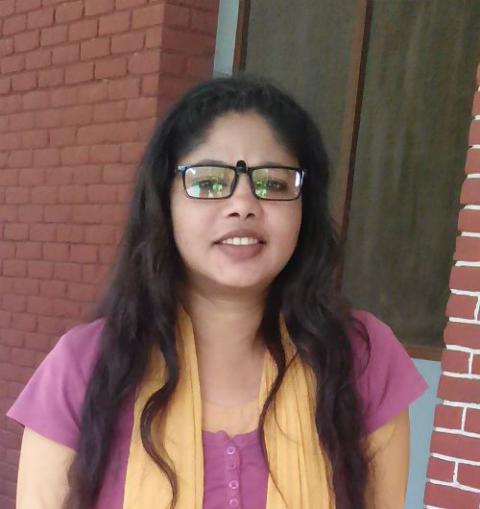
Flora Murmu, 36, now helps street children through her work with Caritas Bangladesh after 12 years at Snehanir in Rajshahi, Bangladesh. (Sumon Corraya)
Flora Murmu, 36, who uses a wheelchair and walking sticks, now works at Caritas Bangladesh after 12 years at Snehanir, where she finished her studies.
"If I did not get educated through Snehanir, I might not be today's Flora," she said.
She said her parents seemed to think she was a burden, but thanks to her job helping street children at Caritas Bangladesh, she can now give money to her elderly father. Once, she brought her father to her workplace.
"Now, my father understands his mistake, that he was wrong," she said. "I proved that a disabled person is not a burden. Snehanir helped me rebuild my life. My father is proud of me."
Children live at Snehanir and go to the nearby schools and college, though in Bangladesh, even teachers are reluctant to take disabled students.
"When we first went to enroll in school [22 years ago], the teachers didn't want to enroll us. They thought we could not perform well," said Murmu, who is Catholic. "But I performed well in the examinations. Now, disabled children are easily welcome in schools."
Snehanir has also helped disabled children who are not Catholic improve their lives.
Ayashya Akter, 13, is Muslim and a victim of family violence. One night, when she was 2, her father threw acid on her and her mother as they slept because he was angry over her mother's lack of a dowry. Her father is in jail, and after her mother was killed in a road accident, Ayashya's grandfather brought her at Snehanir eight years ago.
At first, she was shy and silent, but now, she is active and confident.
"I enjoy the activities at Snehanir," she said. "I attend interreligious prayer. I want to finish my study and want to work with acid attack survivors. The nuns love us very much. They are good human beings."
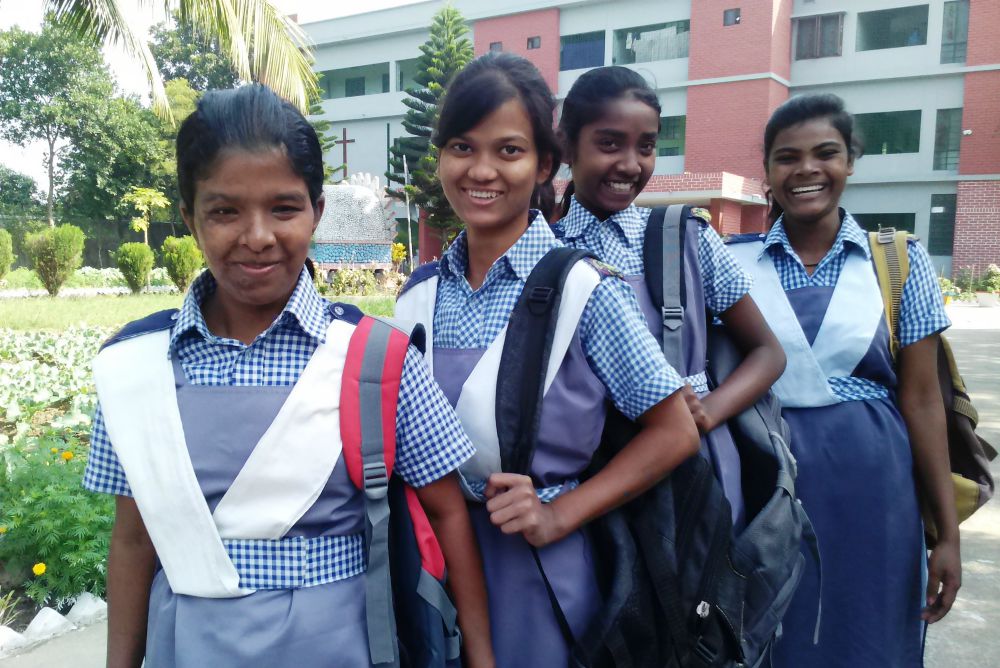
Ayashya Akter, 13, front, with her classmates at Snehanir in Rajshahi, Bangladesh (Sumon Corraya)
Three of the children here today regained their eyesight with the help of Snehanir. Shibazit Roy, 8, was born with poor eyesight, and his parents could not afford to bring him to good doctors. The nuns of Snehanir took him to doctors in Rajshahi, and with better treatment and an operation, Shibazit can now see.
"I never thought I could see clearly," he said. "The nuns gave me a new world. In the future, I want to be a doctor."
Because of Snehanir, some students convert to Christianity.
Former student Niva Dhanour, 35, a member of the Oraon tribe who uses a wheelchair, was Hindu, but the lifestyle of the nuns attracted her.
"Dec. 16, 2010, is the most memorable day in my entire life. On that day, I received baptism," Dhanour told GSR. "The holy life of the nuns transformed me, and that is why I received Jesus Christ. My parents and siblings came to see the baptism ceremony, and they have supported me as I receive Christianity."
Dhanour now teaches sign language at Snehanir after learning the language in Dhaka. She also learned how to make handicrafts at Snehanir and can make paper flowers and showpieces.
"I feel like I am not a disabled person," she said. "As a skilled person, I can earn money."
Not all children at Snehanir are disabled. Lata Murmu, 30, is a nurse who said she learned valuable lessons from the nuns in her four years at Snehanir.
"Although I did not have physical problems, I played with disabled children. I realized the meaning of life in the center was for disabled children to learn skills. I also learned skills," she said.
She said those who are physically capable but do not use their potential have a disability of their own.
"Those who are physically challenged at Snehanir are educated, can sing and dance. They can dream," Murmu said. "I think they are not disabled."
[Sumon Corraya is a Catholic journalist based in Dhaka, Bangladesh. He covers issues affecting the Christian community in Bangladesh.]

